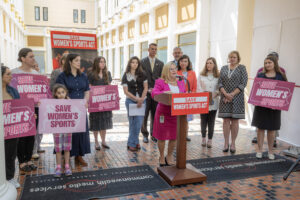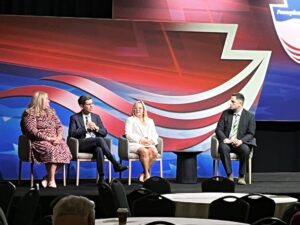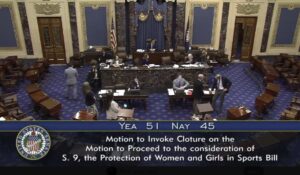The United States Senate’s failure to pass SB9, the legislation designed to protect girls’ sports, has left it up to states and local school districts to step up, adopt and enforce policies that uphold fairness, safety, and privacy for female students. The legal team at Independence Law Center has completed two analyses outlining the legal protections available under Pennsylvania and federal law. These analyses serve as a critical guide for school districts to ensure their policies align with legal requirements.
Protecting Girls’ Athletic Opportunities
Title IX and Pennsylvania law allow schools to provide separate athletic teams for males and females. President Trump’s Executive Order of February 5, 2025, entitled Keeping Men Out of Women’s Sports, requires schools to “protect all-female athletic opportunities and all-female locker rooms and thereby provide the equal opportunity guaranteed by Title IX.”
The Pennsylvania Interscholastic Athletic Association (PIAA) followed suit by updating its bylaws to reflect this requirement, replacing the word “gender” with “sex” to clarify that sports must be separated based on biological sex. Schools in Pennsylvania must now ensure their district policies and actions are in compliance to protect both their female students and their federal funding.
“Title IX was designed to ensure that girls have equal opportunities in sports,” said Jeremy Samek, Senior Counsel at Independence Law Center. “School boards must take action now to adopt policies that align with the law. Without local enforcement, girls will continue to lose out on the opportunities that Title IX was meant to protect.”
Ensuring Privacy Facilities Are Protected by Sex
A second legal analysis by the Independence Law Center team highlights the need for schools to maintain separate privacy facilities for males and females. Pennsylvania law explicitly states that schools must provide privacy facilities that are “suitably constructed for, and used separately by the sexes.” Likewise, federal law under Title IX permits schools to maintain separate locker rooms, restrooms, and showers based on biological sex.
President Trump’s Executive Order of January 20, 2025, reinforced these protections, stating that “intimate spaces designated for women, girls, or females (or for men, boys, or males) are designated by sex and not identity.” This means that any school that allows privacy facilities to be used based on gender identity rather than sex risks federal investigation and loss of funding.
A significant legal victory reaffirming Title IX’s original intent came in January 2025, when U.S. District Judge Danny C. Reeves struck down the Biden administration’s attempt to redefine sex under Title IX to include gender identity. This decision restores Title IX’s protections for women and girls as Congress originally intended—ensuring that sex-based distinctions remain in place for athletics and privacy facilities. Despite this clear ruling, Pennsylvania activists continue to misstate the law, pushing the false narrative that schools must open female sports and private spaces to males. Their strategy relies on the hope that most people remain unaware of this development and the legal protections that remain firmly in place. School districts must reject these misleading claims and uphold policies that follow the law, protect female athletes, and maintain privacy rights for all students.
“No student should be forced into uncomfortable or unsafe situations in their most private spaces,” said Jeremy Samek. “School boards need to implement clear policies that follow state and federal law in ensuring privacy and dignity for all students. Failing to do so puts both students and schools at risk.”
The Responsibility of Local School Boards
With the U.S. Senate’s failure to pass SB9, Pennsylvania school districts must act to ensure compliance with existing legal protections for girls’ sports and privacy facilities. The Independence Law Center’s legal analyses make it clear: schools have the legal authority—and the obligation—to enforce policies that respect biological distinctions in sports and privacy spaces. Parents, students, and concerned citizens should urge their local school boards to review their policies and make necessary changes to align with the law.
Fairness, safety, and dignity for female students must be a priority.






